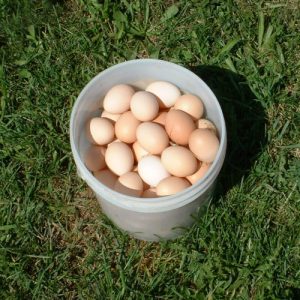Sat, 09/04/2010 – 4:07pm
I’m living dangerously. I just made a Sunshine Cake whose main ingredient is (gasp!) eggs. Yes, dear reader: I licked the bowl. And the spatula. And the beaters, too. But I have not a shred of fear, because the eggs came from my brother Henry’s farm. He has a few dozen hens, and I know exactly how healthy and happy they are because I visit with them every time I bring over my egg shells, watermelon rinds, and corn cobs. They turn those vegetable scraps, plus our neighbor’s organic grains, plus a smorgasbord of plants and insects, into the gorgeous eggs I just enjoyed in the Sunshine Cake batter. While it is true that no one egg is immune to microbial contamination, a decentralized food system with many local egg producers is much safer than a centralized system with few producers for the simple reason that a contamination problem, should it occur, would be extremely limited in scope, and easy to trace and contain.

Such a system has many other added values, not the least of which is that when hens are treated like hens, not cogs in a machine, they produce eggs that tastes like an eggs should — rich, nutty, buttery. Of course it is in the realm of possibility for any egg, from any source, to be contaminated. But somehow in all my family’s many decades of eating eggs from our own hens, we’ve never gotten sick — even though said hens run around outside in the presence of mice, wild birds, and other potential sources of contamination. Barry Estabrook has recently expressed similar sentiments, but he has gone one step further and sent his eggs off to a lab to be tested for salmonella. I think this is brilliant — and would love to see a grant pay for all small egg producers to do the same. No matter which way the results come back, it would be very interesting. Stay tuned!


